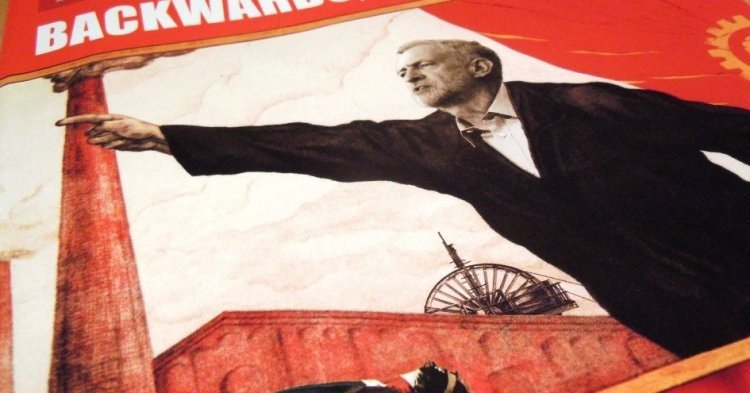Already during the month leading up to the election, Jeremy Corbyn’s campaign for party Leadership was closely monitored and vigorously commented on by friend and foe. While his left-wing stance led to a ‘Corbymania’ especially among younger Labour supporters who self-deprecating referred to their “Comrade Jez”, his declaration to run for Party Leadership was met with greatest reservation by the party establishment. Its first representative, former Prime Minister Tony Blair, accused him to live in an “Alice in Wonderland world”, promoting a “politics of parallel reality.” In that, Blair explained, Corbyn stands in line with such diverse figures as Donald Trump, Alexis Tsipras and Marine Le Pen. However, neither Blair’s assessment of Corbyn’s politics as “backward looking”, calling his supporters “Corbynistas”, nor the joint effort of “150 years of Labour party membership” (Neil Kinnock, Gordon Brown and Tony Blair) were able to discourage Labour supporters from voting for Corbyn.
With close to 60% of the votes of the electorate in the first round, Corbyn’s success was unambiguous. While this triumph was already foreshadowed by the positive reception of his rally during the months leading up to the election, Corbyn’s landslide victory spurred a new level of confrontation among the British media.
The Guardian, that had accompanied Corbyn’s running quite benevolently, took a clear stand against the tabloid press that condemned Corbyn for not singing God Save the Queen during the Battle of Britain memorial service. And his new approach of crowdsourcing questions for Prime Minister’s Question time (PMQs) was also widely welcomed among Guardian Columnists. One of them, Suzanne Moore, ironically commented after Corbyn’s somewhat reserved performance during PMQs: “Some will have been surprised to see he is not an actual terrorist.”
Despite Corbyn’s modest demeanour during his first week as Leader of the Opposition, his election evoked an outcry among the conservative media. In its latest print edition The Economist launched a series of three articles devoted to the “astonishing—and disastrous—victory” of Jeremy Corbyn (as their newsletterannounced). Besides Jeremy Corbyn’s former occupation as “one of the hardest of hardline left-wingers in the House of Commons”, the Economist’s lead article points to Corbyn’s alleged admiration of Hugo Chavez, Vladimir Putin, Hamas, and Syriza. The clear cut verdict: “Mr Corbyn’s election is bad for the Labour Party and bad for Britain, too.”
In order to drive home the point of Corbyn’s “ideology”, his “fantasies” and his “atavistic nostalgia” as curious survivors of a long-gone era, The Economist employs some strong imagery: Its cover presents an adaptation of a Soviet propaganda poster from 1920 in which Corbyn takes the role of Lenin. The original image shows Lenin during a campaign speech, framed by a red flag and a steaming factory in the background. What is missing in The Economist’s close adaptation is the propaganda slogan of the original which read: “A spectre is haunting Europe - the spectre of Communism” (the introduction of the Communist Manifesto). A slogan which actually seems to adequately express the Economist’s fear of "the most uncompromising opposition leader in living memory.”
One major source of criticism and reason to oppose Labour’s new Leader, according to the authors is the anti-European Union standpoint of the “veteran Eurosceptic” Jeremy Corbyn. Besides being “an eccentric who speaks his own mind” and his inexperience with “front-line politics”, his anti-EU outlook, The Economist predicts, is the final nail in his coffin. In speculating about his impending downfall, it seems, The Economist like other conservative media are already trying to aid in bringing it about.
But what exactly is Jeremy Corbyn’s take on the European Union? Is the new Leader of the Opposition actually a thorough EU-sceptic?
The week following Corbyn’s election, conflicting statements of Labour personnel concerning the Party’s standpoint towards the European Union gave commentators reason to speculate about a turn in Labour’s pro-EU standpoint. This speculation was nourished by Corbyn’s “long record of euro-sceptic stances”, from voting to leave the EEC in 1975 to his opposition to the EU Lisbon treaty in 2007, as George Parker, Political Editor of the Financial Times, reported.
In a BBC interview on Thursday last week, however, Jeremy Corbyn made his standpoint quite clear, stating he did not see a situation in which Labour would campaign for a Brexit. His former opposition, Corbyn explained, was aimed at the misguided free market economics of post-Maastricht Europe and that he would rally for staying in the EU in order to change such policies.
Taken his rather straightforward commitment to the European Union, so far, the continent has no reason to feel haunted by a spectre called Jeremy Corbyn. How the new Labour leader will impact the upcoming renegotiation of Britain’s EU-membership will have to be assessed in due time. Within the British media landscape, however, left and right are already closing their ranks, bracing for months and maybe years of intense confrontation.

1. On 25 September 2015 at 19:21, by Karl G. Replying to: A spectre is haunting Europe – The spectre of Jeremy Corbyn
Replying to: A spectre is haunting Europe – The spectre of Jeremy Corbyn
It’s interesting to see, how after so many years Lenin is still such an important issue. In Germany, where I live, there are always news about Lenin statues or busts and even art projects about him as iconographic icon: www.leninisstillaround.com
Follow the comments: |
|
